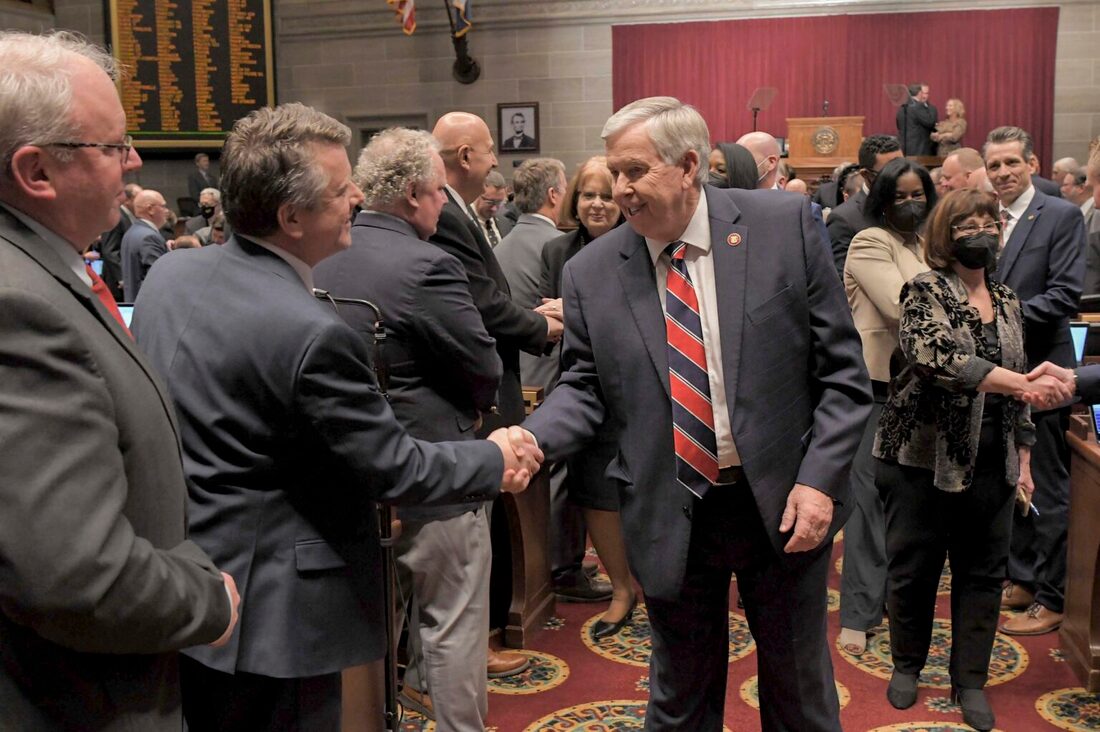|
Missouri Supreme Court to decide whether school districts can jail parents for absent students5/25/2023
by Annelise Hanshaw, Missouri Independent
The Missouri Supreme Court heard arguments Wednesday over whether two single mothers should have been sentenced to jail time because their children missed more days of school than the local district allowed. The case centers on Missouri’s compulsory school attendance law, which states that a parent must ensure their child attends “the academic program on a regular basis.” Assistant Attorney General Shaun Mackelprang, representing the state, argued that the definition of “a regular basis” means attending school every day on the district’s schedule. “Do I have to go to school everyday? The answer is yes,” he told six Supreme Court judges Wednesday morning. “You have to go to school every day that the school is in session.” Ellen Flottman, a public defender representing Caitlyn Williams and Tamarae LaRue, argued the law is unconstitutionally vague and inconsistently applied. “The state’s position is anti-parent. Most of the school districts are not prosecuting these parents,” Flottman said Wednesday. “Schools have to work with parents; they have to have policies because they want the kids to go to school.” “But this is a kindergartener and a first grader. Is missing one day in November and one day in December going to hurt this kindergartener’s education that much?” Case Background Williams and LaRue’s children attended school in the Lebanon R-III School District, about an hour outside of Springfield. The district has a 16.1% poverty rate, according to U.S. Census Bureau data, compared to Missouri’s 12.7% poverty rate. During the 2021-2022 school year, Williams’ six-year-old daughter missed 16 days of school before the district filed a probable cause statement. A Laclede County Circuit Court judge charged Williams with a misdemeanor and sentenced her to seven days in jail. Williams called her daughter out from school sick for six of the absences, but the school counts these as “verified” but not “excused” and tallies the hours and minutes of missed instructional time toward her percentage. The district’s handbook, which parents check a box that they have read when they register online, says parents must notify the school of absences but it does not clarify the difference between “verified” and “excused” absences, such as those with a doctor’s note. “My clients were not acting knowingly…. They’re being misled by the school handbook and the school administrators,” Flottman said Wednesday. The handbook also says: “The state mandates that students maintain 90% or higher attendance each year in school and that continued and valuable learning cannot take place without regular attendance.” State statute does not mandate a 90% attendance rate, though students who maintain this level of attendance contribute greater to school accreditation, Mackelprang said Wednesday. Mackelprang argued in a filing in the case that high attendance contributes toward a school’s funding. “Daily attendance, even down to the hour, has important consequences for schools and, by extension, all of the students at a given school,” Mackelprang wrote. LaRue’s six-year-old son was absent 13 days, according to Flottman, and LaRue called the school with explanation for six of those absences. The district says his attendance, based on the number of hours present, is just under 80%. Court documents say LaRue gave the following reasons for her son’s absence: Doctor appointment, fever, at dad’s in Iowa, another appointment, overslept and sick. Documents mention siblings and that the family contracted COVID-19 during the school year. LaRue was sentenced to 15 days in jail by a different Laclede County Circuit Court judge than Williams, but the sentence was changed to two years of probation. Arguments Flottman’s argument was three-pronged: The parents didn’t know that they were violating the rules because the handbook didn’t state that absences without doctor’s notes are unexcused; the circuit court failed to prove beyond a reasonable doubt that the children’s absences were beyond regular attendance; and the state statute is “unconstitutionally vague” by failing to define what “regular” attendance means. She opened the arguments by saying she attends church “on a regular basis,” although she missed a service recently and has a vacation planned. “The state has argued that regular means every day,” she said as Judge W. Brent Powell interrupted her. Powell said he liked her church analogy but asked if the nonattendance rules were like the speed limit, where not everyone that gets caught breaking the law gets a ticket but officers have discretion on what is too far. Flottman responded by using an example introduced in Mackelprang’s brief, the Wisconsin compulsory school attendance law which says children should attend school “regularly.” The Wisconsin Court of Appeals defined “regularly” as “constantly and uniformly,” Mackelprang wrote. Flottman said the state’s argument also helped her clients, for Wisconsin’s law has a “specific schema,” she said Wednesday. “Missouri doesn’t give that kind of guidance to parents,” she said. Judge Mary R. Russell inquired Mackelprang about why Missouri lawmakers didn’t include more specificity in the attendance law. “Why would the legislature choose to write it this way instead of in a way that is more articulate?” she asked. “They just have to write it in a way that is adequate,” Mackelprang said. “So, is the legislature leaving it up to local school districts how to enforce this word?” Russell asked, inquiring about the definition of “regular attendance.” “How to interpret this word?” “There probably is some discretion of when they are going to go to the prosecutor with it,” Mackelprang said. Flottman said she was worried about this leniency allowing schools to apply different standards to students. “The students that take a day off to go deer hunting or their parents who take their children out of school for a week to go to Disney World are not being prosecuted for this. So there’s a difference between prosecutorial discretion and arbitrary enforcement,” she said. Judge Robin Ransom asked if she would make the same argument if it were not a criminal case. “I do think the criminalization of this certainly has to do with it. We’re talking about the liberty of people who are just trying to do the best they can,” Flottman said. She said she would argue that the state should get involved to provide services to get the children to school. Mackelprang said the statute is not “anti-parent.” He said parents are in control of young children and have options to homeschool or enroll them in private school. “Women make the decision to enroll them in a public school, like the parents did in this case,” he said. “They’re subject to the terms of this statute.” The judges can’t base their decision on violations of the school handbook, for the state’s case is that Williams and LaRue broke state law. by Rudi Keller, Missouri Independent Gov. Mike Parson wants to spend nearly $1 billion to widen Interstate 70 in congested areas while seeking federal funding to complete the job statewide. In his budget proposal delivered to lawmakers Wednesday, Parson asked for $859 million from the more than $5 billion in surplus general revenue to widen the highway in suburban areas of Kansas City and St. Louis and through Boone County near Columbia. The proposal is just a piece of a project Missouri Department of Transportation officials estimate would cost $2.7 billion if I-70 was widened statewide. In his State of the State speech, delivered to a joint session of the legislature Wednesday afternoon, Parson said congestion on I-70 is both dangerous and a drag on the state economy. “To those who say we can’t afford it, I say we can’t afford not to,” Parson said. “This is a once in a lifetime opportunity, and the time is now.” Overall, Parson is proposing a $51.6 billion state budget, with $14.3 billion in spending from the general revenue fund. The state has a general revenue surplus of about $5.2 billion, the largest in its history, and the budget plan would leave about $4 billion in the bank at the end of the coming fiscal year, state Budget Director Dan Haug said during a briefing before Parson laid out his proposal to lawmakers. “We’re trying to work it down gradually, responsibly,” Haug said. “The governor is adamant that he wants to leave the state in a better position than when he came in.” The budget anticipates a significant slowing of state revenue in coming months. General revenue has been growing at double-digit rates for 30 months but this year’s growth is expected to be less than 2%. Several factors, from an income tax cut last year and a slowing economy to an anomalous rush of revenue from capital gains will play into the slowdown in tax receipts, Haug said. That slowdown has not materialized. Through Tuesday, state general revenue was up almost 15% for the fiscal year. If the current growth rate continues the surplus could grow by as much as $1.8 billion. A conservative estimate that undershoots revenue is better for the state than an estimate that overstates receipts, House Budget Committee Chairman Cody Smith said. “It’s the best we have at this point and it’s too early in the calendar year, too early in the tax year, to pivot from this,” Smith said. Other major initiatives in the budget include:
While it is not a new initiative, Parson’s budget will continue a program that pays 70% of the cost for schools to pay every teacher at least $38,000 a year. But he did not ask lawmakers to set that as the base in state law. Increasing the minimum pay for teachers to $38,000 will cost $29 million; increasing the statewide average of $51,557 – 47th in the nation – will cost $81 million for each $1,000, according to the Teacher Recruitment and Retention Blue Ribbon Commission report issued in October. A permanent increase in transportation funding, along with growing revenue from a sales tax distributed on a per-pupil basis, means schools will have more state money than ever next year. Smith said lawmakers may need to mandate teacher raises if districts don’t dedicate increased funding to salaries. “I like the idea of funding public education and letting locals determine how to spend it,” Smith said. “I would like to think that they know that they need to prioritize teacher pay. But here we are with underpaid teachers.” Rep. Peter Merideth, D-St. Louis and ranking minority member of the Budget Committee, said the legislature should write higher minimum salaries into law. “I would argue we need to get to $40,000 pretty fast, to keep up even with just neighboring states, let alone to just hire quality people in this economy and pay people close to what they deserve,” Merideth said. Addressing the state’s need for child care has been near the top of the agenda for leaders of both parties and for business groups like the Missouri Chamber of Commerce. Parson proposed $78.5 million to increase subsidies that help low-income families pay for child care and pass incentives including tax credits for businesses to provide on-site childcare. The boost to funding for pre-kindergarten means “50 percent of all our families with pre-k students will be able to enroll their children in expanded programs through their local school district or charter school at no cost,” Parson said. The investments in child care will help working parents now but quality programs will also help the state’s economy in th future, Senate Appropriations Committee Chairman Lincoln Hough, R-Springfield, said. “Good childcare is preparing those kids for the start of their education, so it all works in concert, right?” Hough said. Parson last week revealed one of his big proposals for the year – an 8.7% pay hike for state employees, equal to the inflation adjustment added to Social Security checks this month. In his speech, Parson said the increase, along with a $2 an hour differential for night work in jobs responsible for people under the care of the state. “With more than 7,000 positions open across state government, this wage increase is necessary, and it is the minimum we must do,” Parson said. The pay raise proposal drew praise from Senate Minority Leader John Rizzo at a news conference last week. “I’m encouraged by the announcement that state employees will see an extremely large pay increase,” Rizzo said. But he also said Democrats need to be muted in their praise for what they like in Parson’s budget so Republicans won’t decide they don’t like them. “They have gotten to a place where they have demonized Democrats for so long, that when I say, ‘hey, the governor is doing a good thing with you know, adding child care or a teacher pay raise,’ they get angry at him,” Rizzo said. The I-70 proposal will not use any federal highway funds, but the state will be looking to leverage its influence in Congress to help widen the highway to three lanes in each direction statewide. Missouri has members of Congress in charge of key committees where money could become available. U.S. Rep. Sam Graves of Tarkio chairs the Transportation Committee and U.S. Rep. Jason Smith of Salem chairs the Ways and Means Committee “We certainly are going to be very aggressive working with Congress,” Haug said, “to pull down as many federal funds as we can on this.” Missouri Gov. Mike Parson talks with lawmakers as he leaves the House chambers following his 2022 State of the State address (Tim Bommel/Missouri House Communications).
|
Categories
All
Archives
July 2024
|
Grain Valley NewsGrain Valley News is a free community news source published weekly online. |
Contact Us |




 RSS Feed
RSS Feed
